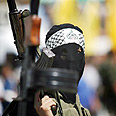
Will Hamas resume attacks?
Photo: AP
Calm on the Palestinian front is allowing Israel to act like a normal country as it heads into elections and to put burning domestic issues at the head of the campaign.
Dr. Boaz Ganor is the deputy dean of the Lauder School of Government and Diplomacy at the Interdisciplinary Center HerzliyaBut we must not fool ourselves into ignoring reality. The relative security calm is no more than temporary, and it won't last long.
In practice, Israel is finding itself facing three of the most serious strategic threats it has known in the past 10 years: Anarchy in the Palestinian Authority and continual strengthening of Hamas, a steady flow of global jihadists into Israel and the territories, and Iran's nuclear program, accompanied by explicit threats against Israel.
Temporary lull
The reduction in Palestinian terror is temporary, and will continue no longer than next week's Palestinian Legislative Council elections and the establishment of a new Palestinian political establishment.
Even if the unexpected occurs and Hamas decides to continue the cease-fire, other organizations will continue their attempts to stage terror attacks.
These attempts will require Israel to stage pre-emptive and reactive strikes. The road from here to serious deterioration is short.
More than that: Palestinian leader Mahmoud Abbas' lack of will or ability to disarm terror organizations and to establish his rule in the territories has placed us on a powder keg, when the deterioration depends on the motivation and judgment of terrorists.
But Palestinian terror has gathered strength in light of terrorists' improved ability to fire rockets into Israel, an open border between Gaza and Egypt that allows terror activists and weapons to freely enter the Strip, and international pressure on Israel to allow free passage between Gaza and the West Bank that would enable the transfer of these weapons to the West Bank.
The second strategic threat is global Jihad. Signs are growing that al-Qaeda, Iraqi terror leader Abu Musab al-Zarqawi, and other organizations are trying to focus their terror activities on central Asia and the Middle East, and as usual, Israel finds itself right in the eye of the storm.
The Palestinians' fate is no more important to Bin Laden and co. than last year's snow. They are interested only in creating a world-wide Islamic caliphate.
In the first stage their goal is to bring down replace Arab regimes near Israel, and this represents a real failure in realizing their dream.
Therefore, Zarqawi's activists and others have ranked up their presence in countries bordering on Israel – Jordan, Lebanon, and Egypt.
The vacuum created in the Gaza Strip after Israel's departure and Abbas' failure have allowed global Jihad to rank up its terrorist abilities in Gaza, and eventually they will probably do so in the West Bank as well.
Facing Hizbullah
Israel faces a terrorist menace no less threatening from Lebanon's Hizbullah.
While it is true that since Israel's withdrawal from Lebanon, apocalyptic predictions have proven false, and even though the organization has gained strength and has developed the ability to fire long-range missiles with thousands of rockets that can reach most of Israel – domestic and international circumstances prevent the organization from using this ability.
These considerations could change in a flash should any party try to neutralize Iran's nuclear ability.
Iran could – were its installations attacked by any outside power – support, or even demand, its proxy organization, Hizbullah, use its missiles against Israel. Thus, we have a third strategic terrorist threat against Israel.
The socioeconomic agenda that correctly worked its way into the Israeli consciousness several weeks ago, must therefore give way to the security agenda.















